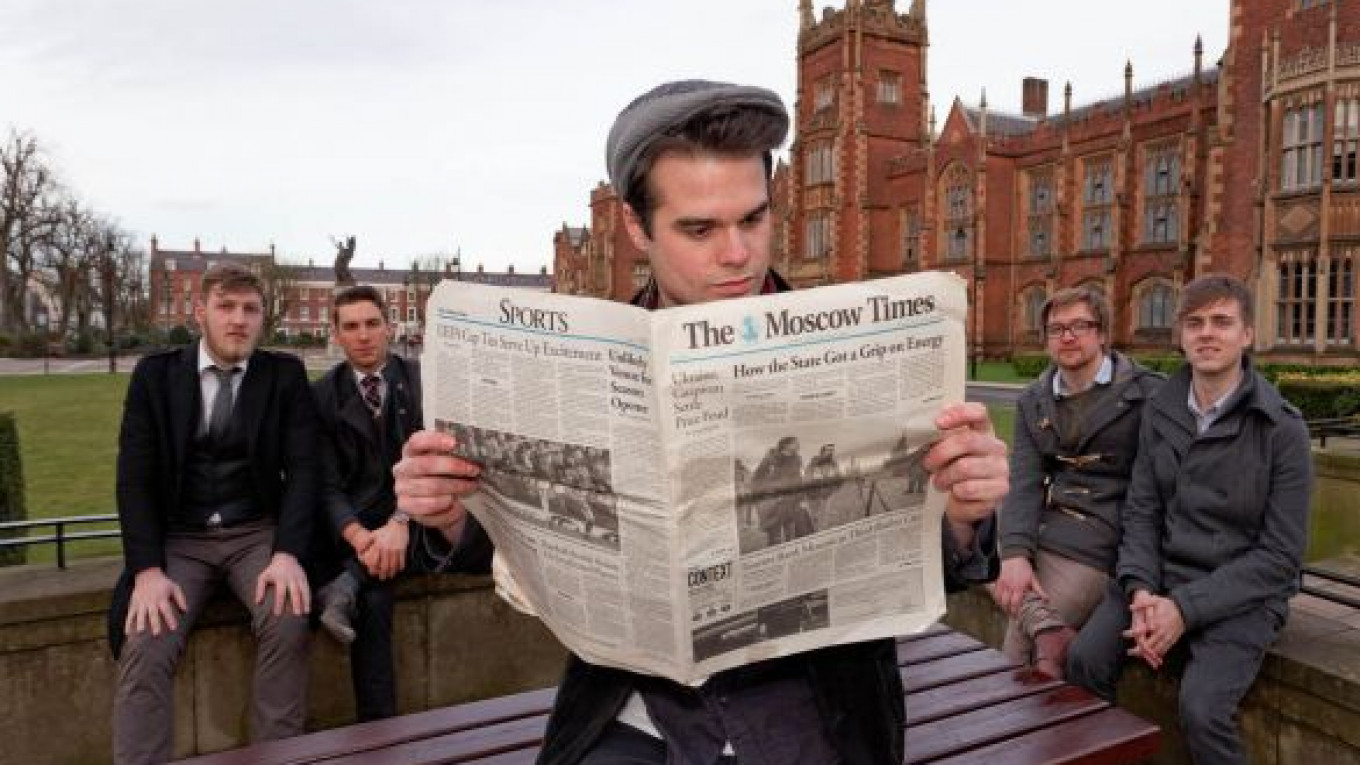BELFAST, Northern Ireland — In Belfast, The Moscow Times is hip.
One in a wave of up-and-coming Northern Irish alternative rock bands borrowed the name of Moscow’s only daily English-language newspaper as the embodiment of Eastern European cool.
The five members of the Belfast-based Moscow Times said the band’s unusual choice of name has helped it stand out from the crowd, earning the attention of BBC Radio One DJs and a prestigious spot at this year’s Oxford Ball.
“So many people look west to L.A., to New York to define what’s cool. Moscow isn’t given enough credit,” said front man Mike Hooley, who has never visited Russia. “It’s a talking point. So many bands have names that mean nothing at all.”
While the band members were struggling to think of a name that would get them noticed in the sea of young Belfast rock bands, lead guitarist Josh Deery was rooting through his closet and came across an old copy of the paper he had picked up during a school trip to Moscow, a city he remembered as “expansive, intimidating and not quite safe.”
“I found a copy and thought, ‘That looks really cool,’” Deery said during an interview with the group’s newspaper namesake at a Belfast rock club.
The band just recorded its second EP, “Marco Polo,” and is planning a British tour to be followed at some point, they hope, by a tour of Russia.
One of their biggest ambitions, band members said, was to follow in the footsteps of fellow Belfast band And So I Watch You From Afar, whose two-week tour of the former Soviet Union included stops in Moscow, Penza and Kazan in temperatures that dipped to minus 30 degrees Celsius.
“I don’t know much about Russia, and that’s what excites me about it,” guitarist Luke Hanley said. “It’d be pretty unfair if we didn’t make it out there.”
The band has no regrets about the name even though a Google search for Moscow Times leaves the band’s site buried below half a dozen links to the paper.
“Moscow Times band” brings up articles about Pussy Riot, a group they came across for the first time on the Twitter feed of the newspaper that shares their name.
The Russian connection has earned them a number of Russian fans — or at least followers on Twitter and Facebook.
The band members were thrilled that The Moscow Times had linked their video on Twitter.
“We said, ‘Cool, thanks. Thanks for not suing us!’” Hanley said.
Through their link, they have developed an interest — if passing — in Russian politics.
“It has opened our eyes to a lot of things,” Hanley said. “Most of the stuff barely gets a mention in the press here.”
They haven’t quite gotten as far as writing songs about Russia, though, and it’s not entirely clear how interested their fans would be in that.
Hooley dedicated a song to the founder of The Moscow Times newspaper, Derk Sauer, during a gig at Belfast’s Pavilion rock club recently. The tune got a muted response from the crowd of Belfast hipsters.
And while the band is keen to tap Moscow’s spy-novel aura, that sentiment doesn’t extend to all things Russian.
“Is Putin cool? No. It’s the city itself,” said bass guitarist Arran Dinsmore, who traveled to Russia with Deery on the school tour. He later sheepishly admitted that he thought St. Petersburg was nicer than Moscow.
Coming across a yellowing copy of the paper just when the band was searching for a name was pure coincidence. But the bandmates insist they wouldn’t have picked just any paper’s name.
Asked whether the name of The Moscow Times’ longtime rival, The Moscow News, might have been a viable alternative, Deery shook his head.
“It doesn’t quite have it,” he said.
Contact the author at artsreporter@imedia.ru
A Message from The Moscow Times:
Dear readers,
We are facing unprecedented challenges. Russia's Prosecutor General's Office has designated The Moscow Times as an "undesirable" organization, criminalizing our work and putting our staff at risk of prosecution. This follows our earlier unjust labeling as a "foreign agent."
These actions are direct attempts to silence independent journalism in Russia. The authorities claim our work "discredits the decisions of the Russian leadership." We see things differently: we strive to provide accurate, unbiased reporting on Russia.
We, the journalists of The Moscow Times, refuse to be silenced. But to continue our work, we need your help.
Your support, no matter how small, makes a world of difference. If you can, please support us monthly starting from just $2. It's quick to set up, and every contribution makes a significant impact.
By supporting The Moscow Times, you're defending open, independent journalism in the face of repression. Thank you for standing with us.
Remind me later.


